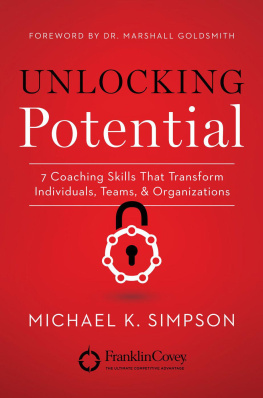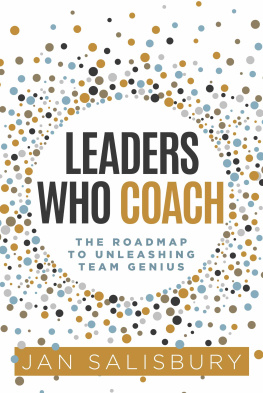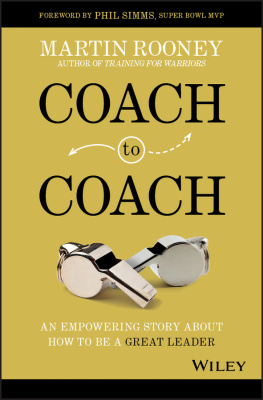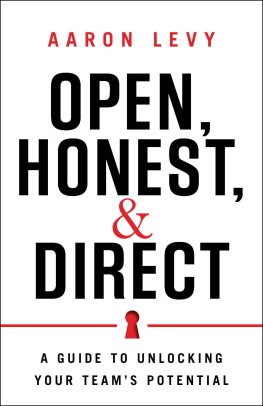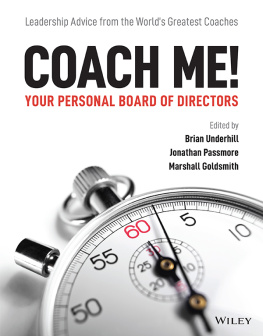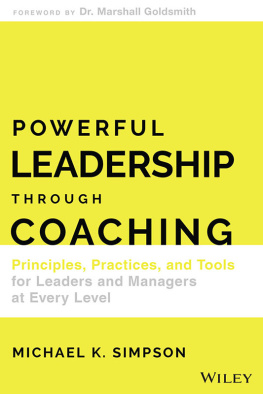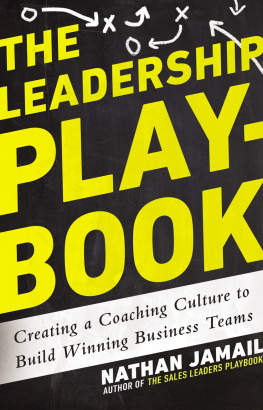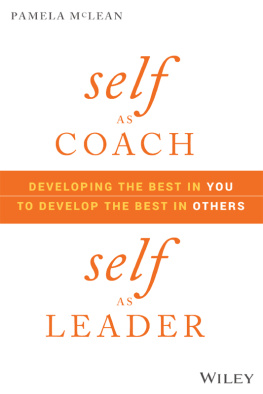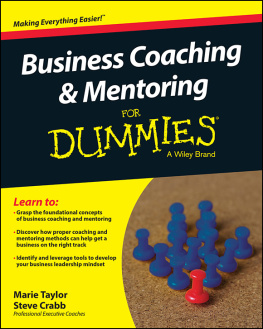

Text copyright 2014 FranklinCovey
No part of this book may be reproduced, or stored in a retrieval system, or transmitted in any form or by any means, electronic, mechanical, photocopying, recording, or otherwise, without express written permission of the publisher.
Published by Grand Harbor Press, Grand Haven, MI
www.brilliancepublishing.com
ISBN-13: 9781477824009
ISBN-10: 1477824006
Cover design by Faceout Studio, Tim Green
Interior visuals by Faceout Studio, Emily Weigel
Library of Congress Control Number: 2014932185
CONTENTS

FOREWORD
Dr. Marshall Goldsmith
Michael Simpsons Unlocking Potential is a skillfully written treatise about how you can be a great coach In the book, Michael coaches you on how to be a better manager-coach; as a result, you, your people, and your organization can thrive. In this book, youll find the paradigms and key principles that are essential for you to coach effectively from and to any level of the organization.
This book is such an important work because in all my years of coaching and all my work with senior leaders, Ive found that one of the most common complaints direct reports have is that their managers do a poor job of providing coaching! Validated in 360-degree feedback scores for 30 major corporations, the item provides effective coaching when needed consistently scores in the bottom 10 of all items when direct reports evaluate their executives.
There are a number of reasons why managers tend to do a poor job of coaching. For one thing, executives are often managing knowledge workers, that is, people who know more about their work than their boss does. How can a manager be expected to coach someone who already knows 10 times more about his or her job than the manager does?
In Unlocking Potential, Michael identifies seven key skills that every great coach needs to help transform people into great employees. None of these include detailed instructions on how a knowledge worker should do his or her work! Michael and I agree that people want ongoing communication with their managers concerning the big picturehow their work is making a difference, and suggestions about how they can improve.
Another reason managers might avoid coaching is because they are so busy with their own jobs. If you view coaching as a complex and time-consuming process, you wont do it! And because your direct reports are as busy as you are, they may not want or need coaching to be a time-consuming process. As Michael points out, they want it to help them break through from one level of performance to another. They want help becoming better.
Follow Michaels advice in this great book. Hell help you coach individuals without alienating them. Hell help you focus on how you can help people be successful in the future, rather than dwell on their past mistakes. Hell give you guidance on holding coaching conversations with individuals, conversations where you listen carefully and fully commit to helping them succeed. Individuals will grow and develop while you discover the invaluable rewards of helping them succeed. Andnot to be discountedyour team and organization will thrive as a result!
Foreword by Marshall Goldsmith, author/editor of 34 books, including the bestsellers MOJO and What Got You Here Wont Get You There.
INTRODUCTION
Success as a leader is a difficult thing. As a leader, your success is directly measured by the success of those working on your team, and in fact their success is your success. Team members rely on you in order to succeed, and you rely on them. So whether you are a CEO, a government administrator, a department manager, a project leader, or any other kind of leader, you need to know how to coach your team.
The need for effective coaching has never been greater. Gallup research shows that a team that is highly engaged has double the chance of job performance and success. Engaged workers are more productive, profitable, loyal, and customer focused. Most importantly, the research also shows that an immediate manager has the most profound influence on an employees level of engagement.
Thats why every leader, manager, or supervisor needs to become a great coach. In an era when people are required to do more with less, they can become disengaged. The essential work of a coach is to engage the teambut many leaders are ill-equipped to do that. Often, these leaders possess great functional skill, technical know-how, expertise, and training in business management, finance, accounting, operations, sales, marketing, engineering, law, or science.
But they dont know how to be an effective coach.
One of my clients is a key business leader in Shanghai, China. During one of our coaching sessions, he told me, When I graduated from law school, I came out with the very best of academic, analytical, research, and legal tools. But what I was not trained in, and what I was not prepared for, was how to coach my people. The first day I had a boss, I had direct reports; I had peers I needed to work withbut I had absolutely no training on how to inspire them, help them to improve performance, or break down barriers. Everything I did in my role as a leader had to be done with and through other people. I had to achieve goals with other people. Everything depended upon what I was never taught to do.
Most of the executives and teams I work with say the same things.
Whats fascinating is that people want you to coach them. Not long ago, Columbia University Business School surveyed ten thousand people on whether they would like to have a coach and why. Almost everyone said they would welcome some coaching. Thirty percent said they wanted coaching to help them with life, purpose, vision, creativity, and integrity. Seventeen percent said they needed help with their entrepreneurial activities and with their team, sales, and cross-cultural diversity issues. Sixteen percent cited leadership and management needs. Eight percent wanted help with relationships, and another 8 percent sought help with career transitions and future job planning and career development. Many asked for help with behavior change, leadership effectiveness, and worklife balance.
Clearly, coaching is not just about the organization or the team. Coaching is about people. And that may seem like an overwhelming task, one that requires more than your business training prepared you for. Of course, you can be a good coach or a bad coach. And there are no reality-show judges to watch you coach and tell you whether youre doing a good job or not. But if you follow the few vital universal principles in this book, you will likely do just fine.
Much of what we do for each other every day in the way of guidance and support is a type of coaching. But coaching is more than consulting or advising: its a specific set of competencies, skills, and behaviors, and it takes a certain kind of good intent and character. Perhaps the best definition of coaching is unleashing or unlocking the potential of another human being. We like the definition because its so excitinghuman potential is truly infinite and at the same time totally personal. Everyone has unique strengths and challenges.
We all have had coaches who have helped us along the way, and more than likely, they were more than just a boss or a trainer. They could speak not only to our business habits and performance but also to our personal lives and our betterment as individuals. In fact, sometimes our best coaches are coworkers, spouses, and friendspeople without authority to speak organizationally but whom we trust to give us mentoring and advice.
Next page
